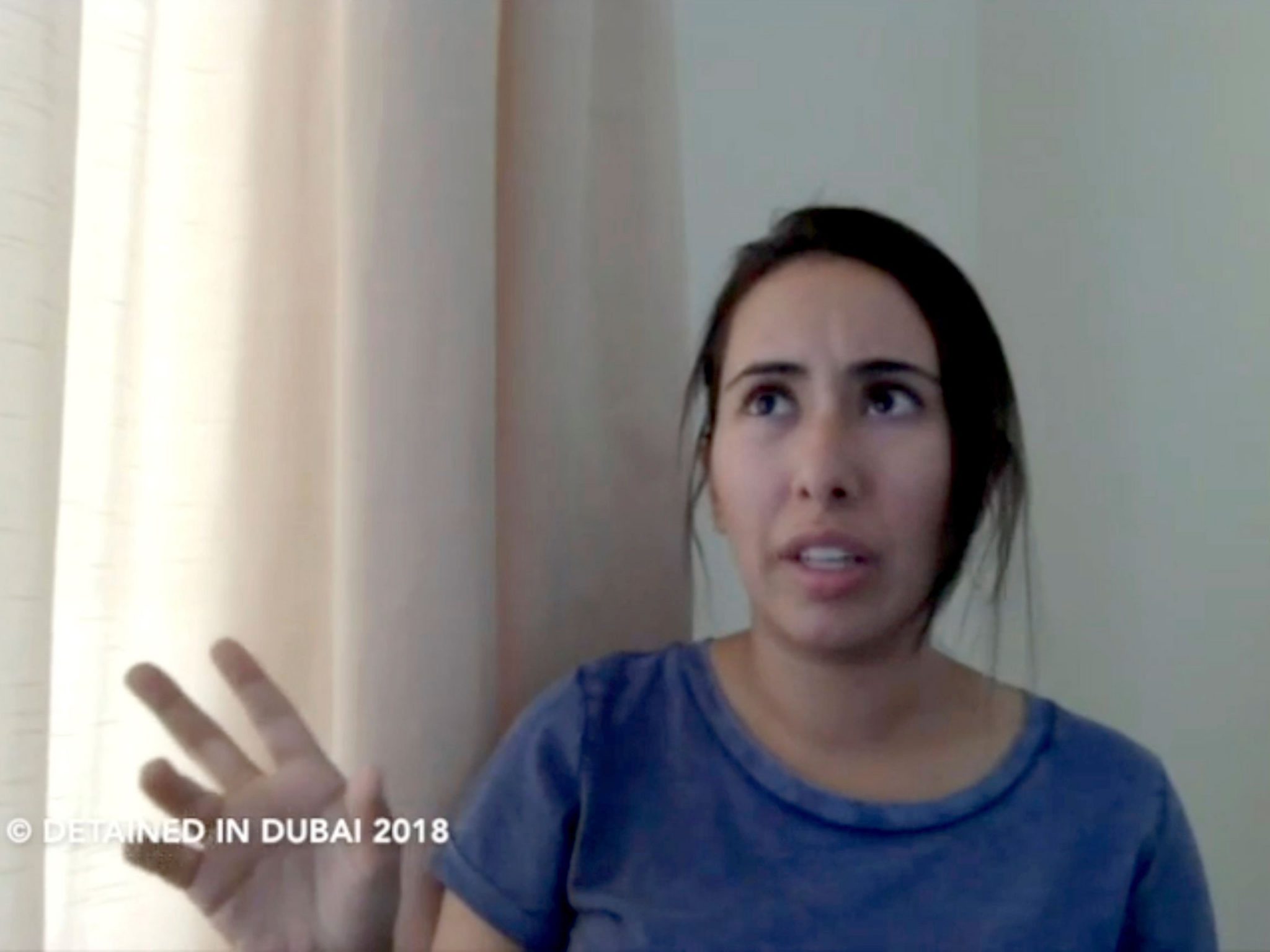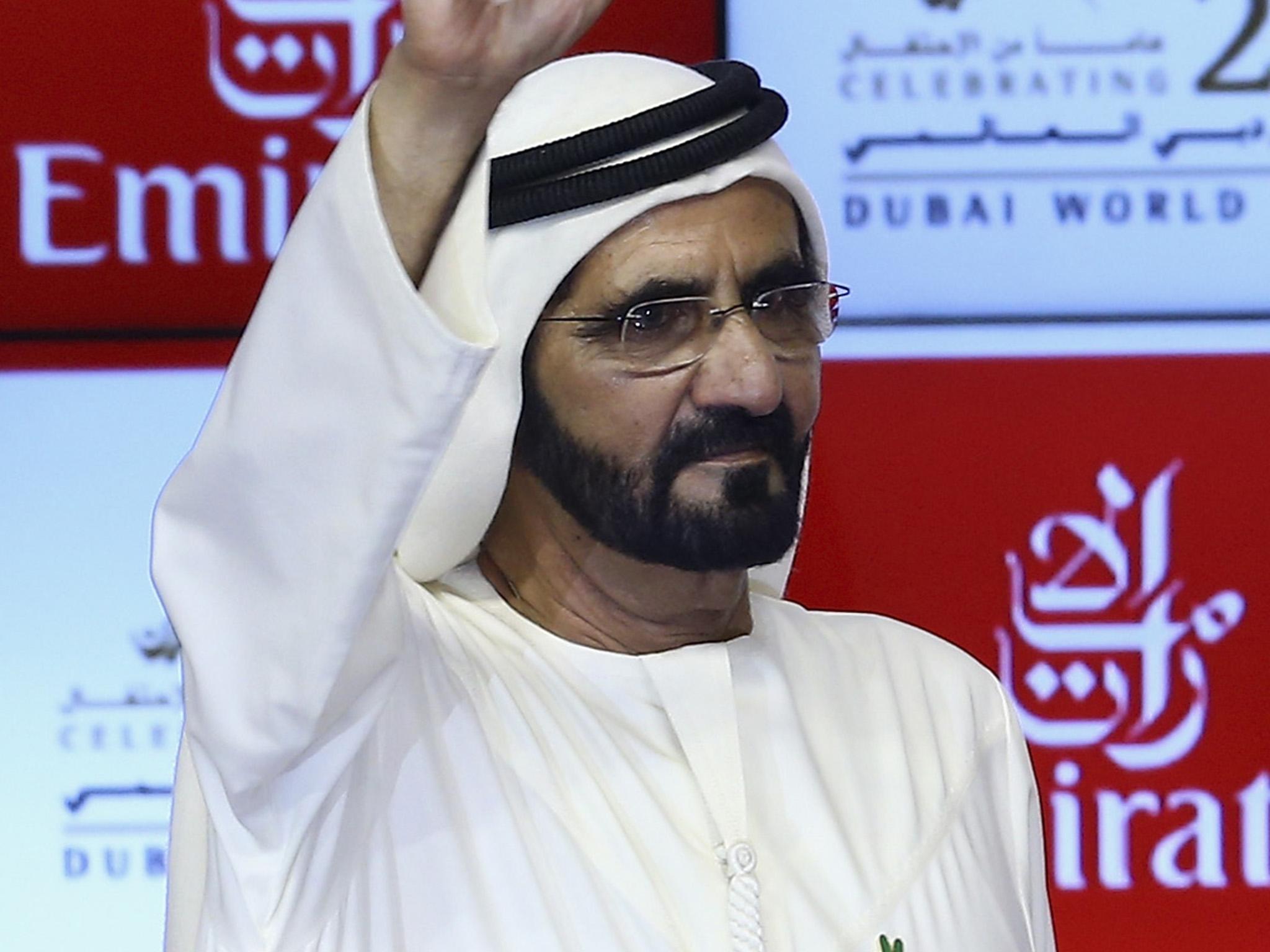Bel Trew
March 4, 2019, The Independent
Sheikha Latifa has made no public statement since she was allegedly captured at sea last March trying to flee Dubai

Rights groups have demanded the United Arab Emirates grant them immediate access to an Emirati princess, one year on from her alleged capture by the authorities while she was trying to escape the country.
Sheikha Latifa, 33 the daughter of Dubai’s ruler Sheikh Mohamed bin Rashid al-Maktoum, has not publicly spoken since she was apparently forcibly returned to Dubai and disappeared for nine months last year, after she was detained at sea while trying to flee to Goa, India.
She has only been seen once since then, when she appeared in photographs taken in Dubai during a visit by Mary Robinson, former president of Ireland and UN High Commissioner for Human Rights.
The highly publicised and bizarre meeting in December was panned by rights groups for being stage-managed by the Emirati ruling family: Ms Robinson is a personal friend of Sheikha Haya, a wife of the Dubai ruler.
Exactly one year on from Latifa’s dramatic capture at sea, rights groups told The Independent they were deeply concerned about her welfare and still had no knowledge of what happened to her between her March 2018 capture and December when she reappeared in Dubai.
Pleas to the UAE for an independent delegation to be granted access to the royal to assess her have gone unanswered.
“Human Rights Watch is still calling for her to be able to travel to a third country where we and other monitors can be assured she is able to speak freely and independently without fear of retaliation,” Hiba Zayadin of HRW told The Independent.
“Ms Robinson is not equipped to make an evaluation of Latifa, who was in the presence of people who allegedly forcibly disappeared her,” she added.
Amnesty International put out a similar call.
“There has been no reply from the UAE, which has never responded to anything regarding domestic human-rights abuses that Amnesty International has attempted to raise with them,” said Amnesty’s Devin Kenney.
“No new information has emerged since Mary Robinson’s lunch with the royal family, which is the first and last time Latifa has been seen or heard since she was kidnapped off the high seas,” he added.
David Haigh, the CEO of UK based legal advocacy NGO Detained International, whose organisation is working on the case told The Independent they were particularly concerned as they had medical information which proved she was sound of mine and to disturbed as the Emirati authorities had said. Mr Haigh said Tiina Jauhiainen, a Finnish capoeira teacher who had helped with Sheikha Latifa’s escape in 2018, addressed a UN committee on enforced disappearances about the matter in February outlining the abuse both of them suffered.
Radha Stirling, head of the UK-based group Detained in Dubai, told The Independent that the group would raise her case again with the same UN committee in a meeting scheduled next month.
“We only learned at the end of 2018 that Latifa is alive, but she appears to be under some form of medical treatment which she never required before in her life; and she is still not able to communicate or move freely,” Ms Stirling said.
“The UAE has not cooperated with the United Nations enquiry into her abduction, and that investigation is ongoing.”
Sheikha Latifa recorded a video shortly before her escape which was shared online by friends after she went missing.
In it she detailed the reasons for wanting to leave the Emirates, including being barred from driving or travelling and being jailed on father’s orders for over three years.
During the 40-minute video she claimed she had been tortured, held in solitary confinement, threatened with death and drugged during previous escape attempts. She said she feared she would be detained and tortured again if her latest attempt failed.
In March last year she was reportedly driven across the Oman border by Ms Jauhiainen, a close friend who worked at the royal court, before taking a jet ski to a waiting boat manned by Hervé Jaubert, an-ex French special forces officer. Indian coastguards later intercepted the boat and Latifa re-appeared nine months later in the Emirati city.
The UAE has repeatedly denied that Sheikh Latifa was forcibly returned home or harmed but has never explained what happened between her dramatic capture in March 2018 and December when photos were released of her back in Dubai.
Neither has the young princess been given an opportunity to speak for herself.
She is the second of the Sheikh Maktoum’s daughters to allegedly disappear. Latifa’s older sister, Shamsa, was reportedly seized on the streets of Cambridge after fleeing the family’s Surrey estate in 2000 and has not been seen or heard from since.
The Dubai authorities did not respond to The Independent’s request for comment but has repeatedly denied charges of wrong doing.

In a statement written to Sky News in December, the authorities said were “deeply saddened” by media speculation regarding her situation.
They said Latifa was “safe in Dubai” and “looking forward to … building a happy and stable future”.
They denied the “false allegations’ and released photos of her with Ms Robinson, who agreed to visit Dubai to meet her in Princess Haya’s home.
Ms Robinson said after the visit that the princess was mentally unwell and claimed a ransom had been demanded when she disappeared.
“Latifa is vulnerable, she is troubled. She made a video that she now regrets and was part of a plan of escape… under circumstances which need to be examined,” Ms Robinson told BBC Radio 4 in December.
“You have to bear in mind this a troubled young woman who has a serious medical situation. She is receiving psychiatric care. They don’t want to endure any more publicity,” she added.
The former Irish president faced a torrent of criticism from rights groups who said she failed to ask key questions about what why the princess had vanished for so long.
Ms Robinson declined to comment on Monday when The Independent reached out to her.
Detained in Dubai’s Stirling said Ms Robinson “appeared to be reciting almost verbatim from Dubai’s script” and dismissed it as a “PR stunt”.
“The UAE should have not circumvented normal UN protocols.”
Speaking to The Independent Hervé Jaubert, 62 who tried to help the princess escape, said he last spoke to her when he claimed he saw her being dragged off his vessel by the Indian coast guard.
“I’ve not heard anything from her ever since. I believe she is under watch 24/7 and they won’t leave her or let her have a phone,” he said.
He said that the princess had first reached out to him in 2011, after reading his book detailing his own escape, and had been planning her flight for seven years.
Recounting the escape, he said his US-flagged yacht was in international waters and off the coast of India when he contacted Detained in Dubai and other rights groups as he noticed they were being tailed by the Indian coastguard.
He claimed the 4 March 2018 incident was a “full-blown military attack” involving three boats and a surveillance plane, and that he was beaten up by the Indian authorities.
He said he saw Sheikh Latifa be dragged off “kicking and screaming of political asylum”.
“This is a human rights violation. We never saw her again. They took her away on helicopter,”
Rights groups have long complained of rights abuses in the UAE and the lack of freedom particular for women, who are subject to a guardianship system, which means male relatives can take women to court for being disobedient.
The most recent case of a woman trying to flee the country is Hind al-Bolooki, 43, who made a desperate plea last month for asylum in North Macedonia after escaping the UAE when her family would not grant her a divorce.
She posted a video online when her asylum claim was rejected, and said she feared being deported back to the UAE.
Mr Kinney said “Between Sheikha Latifa and Hind al-Bolooki, you have two very public examples of women who felt compelled to flee in dramatic fashion because of male chauvinism and violence.”